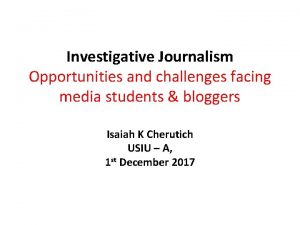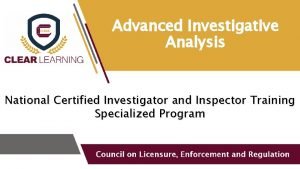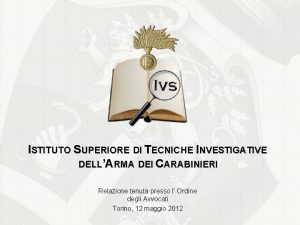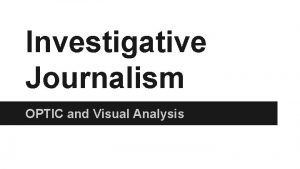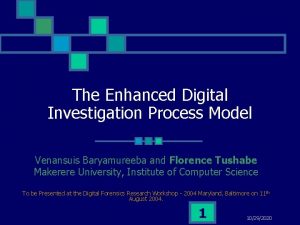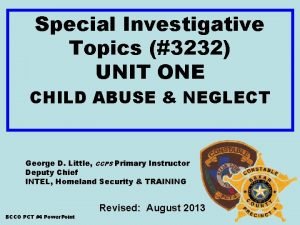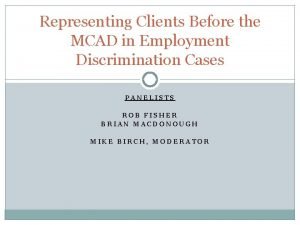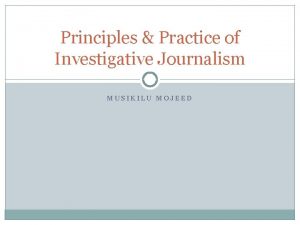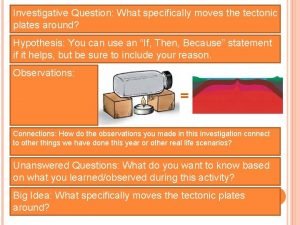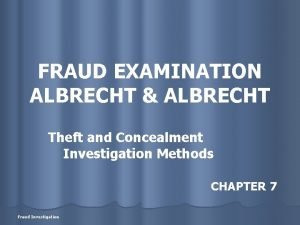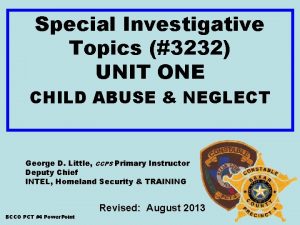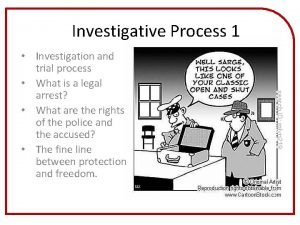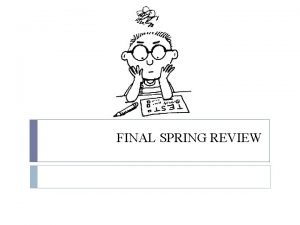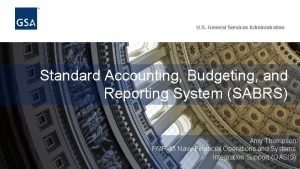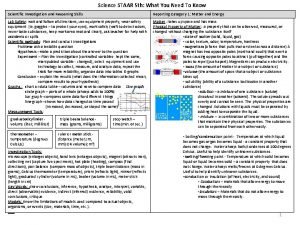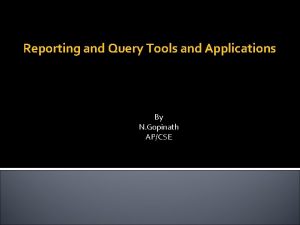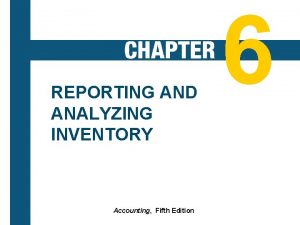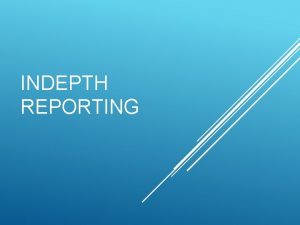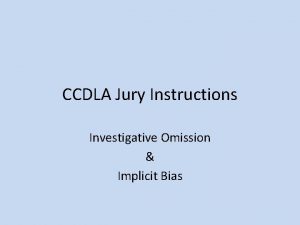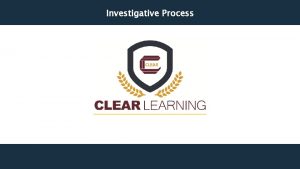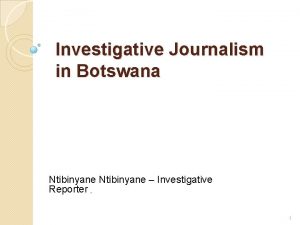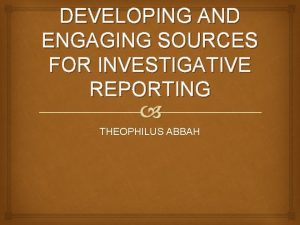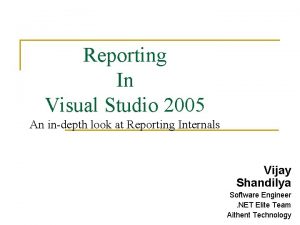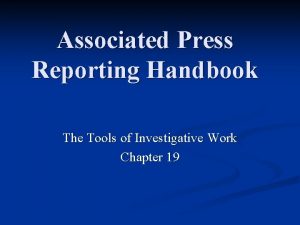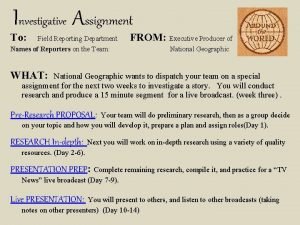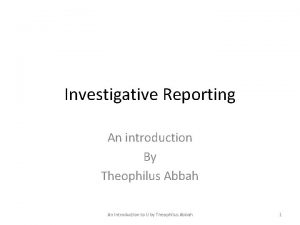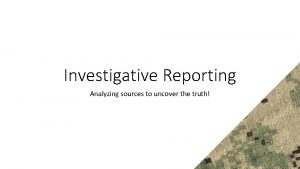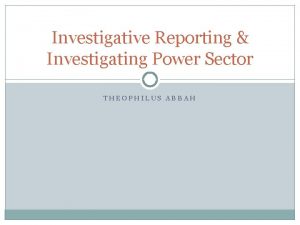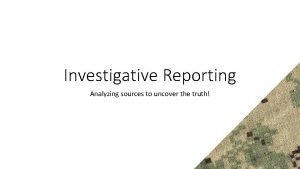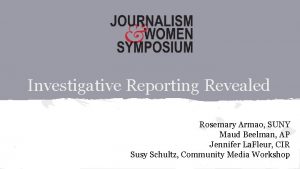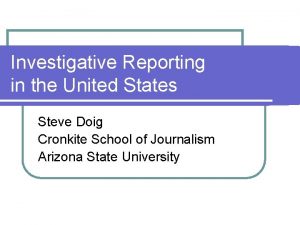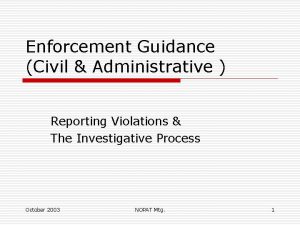InDepth and Investigative Reporting InvestigatingReporting n n n





























- Slides: 29

In-Depth and Investigative Reporting

Investigating=Reporting? n n n Journalists are civic watchdogs, i. e. always involved in in-depth and investigative work. Investigative reporters not different from any reporter gathering facts, they only invest more time and effort revealing facts usually more detrimental to people’s lives or public interest. It’s advanced journalism. They look where others don’t, and they seldom take anything for granted.

Thorough for Everyone n n n In-depths are choice assignments. Usually proactive rather than reactive. Journalists explore a topic thoroughly, learn things that most people don’t have a chance to learn, and tell story without fear of being cut. It may be one long piece that starts on front page and jumps to inside page. . Or a series that runs several days.

National Endowment for IJ: what democratization? ! The US has a NE for the arts and a national science foundation so why not journalism? Isn’t this the real democracy? n However: old-school & institutional media organizations (highly trained investigative reporters needed? Yes! But… n

Individuals or Institutions? n n What about contemporary model of bloggers. (Ex: Glenn Greenwald of Salon. com who reported on a false claim about 9/11, torture & constitutional rights… along with nonprofit orgs and citizen journalists? ) Proposal in US to give award grants to individuals, organizations and institutions that propose projects to better inform American public about their communities, gov, nation, and the rest of the world.

Size of Audience n Another problem in the NE proposal is the strict mathematical formula based on the number of citizens who actually read those reports on news sites (think of women, people of color, marginalized sections of society, intellectuals & intelligentsia, etc…). Might be smaller but no less vital audience.

What is “broad interest”? How about funding also to increase the size of the audience? n And the funding for “imp stories that generate broad interest”. . How did that sound with the real estate/mortgage market a year ago? It was still in the interest of the public to know of the fast growing bubble. n

Voyeuristic Entertainment? n n There are journalists who believe that IJ today (especially TV) avoids serious inquiry and is reduced to voyeuristic entertainment rather than concentrating on facts. Or that it is focused on consumer affairs, or involves hidden cameras (which can produce imp AND trivial programs).

Sexy or Significant? n John Ware (documentary maker) thinks that “some are watchable but more sexy than significant”. He says: “the leakage of reality – the political, commercial, and administrative presentation of events as opposed to the way they really are – is the great sickness of the age”.

Huffington Post US political website with 4 m users a month. It has stirred heated political debate during the last elections, while it’s staffed by 7 reporters only. n Huffington will bankroll $1. 75 million for a group of investigative journalists. n

Smell, Hunch, Research… After “smelling” a story, journalists’ hunch definitely takes them to research. n They prepare themselves for the “language” of a complex topic, rather than asking specialists repeatedly: “what does that mean? ” and “can you explain that to me? ” n

Research. . Introduces reporter to people who have been sources for similar stories before. Usually, if they spoke to a reporter before they’d do it again. n Helps formulate a list of Qs. It is best to know partial answers before interviewing. n

Research. . Provides other articles on the same topic. There may not be any articles on the SAME individuals involved in the story, but likely on the same topic. n Uncovers some good and bad things to look for during interviews. n

Sources of Information Most common are: clippings and references online and in the newspaper library (archive), electronic database, public libraries, etc… n But In-depth reporters often have to dig deeper than traditional sources. n Obscure public records often become the key to a major story. n

Courthouse maybe? n n One renowned American reporter says that he “almost always” goes to the courthouse first: he looks up key names (defendants) in an index. That means you have to know names of key people in your story… AND a well-developed judicial system where people resolve differences in court. . and where you actually have “clean” well kept records.

Interviewing An in-depth is not written after merely interviewing a source or two. n Duff Wilson (New York Times) says: “I interview subjects many times before I have formed a strong opinion and before the source is on guard. This is often a long and quite naive interview. They’re more talkative early, … n

n . . And may try to spin you, and then they also have to talk more later to answer ‘follow-up’ Qs rather than waiting until you have a ton of evidence and then giving a no comment”.

Interviewing tips for indepth n n n Talk to everyone you can. Sometimes the best sources are people who give clues rather than clear cut info. Keep talking as long as you can to as many people as possible. Ask sources for names of additional sources. They might provide you with people you never thought are useful in THIS story.

Know the answers for incriminating Qs in advance. Be ready for sources who deny the truth. Save the toughest sources for last, after gathering most info. n Use tape recorder for particularly sensitive interviews (and you can still take notes). n

Interviews from the outside in n Much like a tightening circle, from least imp to most imp players. Save the bull’s eye till last. Begin at outer rings to gather info about people in the center. That gives you the chance to start by Qs you know the answer to. Slowly, the source finds it harder to deny hard evidence (i. e. your homework).

Confrontation vs. Informed n n Confrontation interviews may look good on TV, but they seldom make it in print. You don’t want to go in there like a prosecutor BUT you can still corner the source. Informed discussion: a lot of people like talking to someone who shares their “interest” so they get deeper. Thus, they either dig their own graves, or they prove there is another side to the story, an alternative point of view.

Double and triple checks In-depth reporters do not have same deadline pressures as those who cover breaking or quickly developing news. n They should have time to double-check and triple-check what sources tell them. n

It is not unusual for a beat reporter to go with a single source. n In-depth is the opposite because they have time and they are going for more complex and sensitive info. n Rule: two sources are usually enough, but it’s always better to have more. n

Confidential sources n n Most reporters avoid unnamed sources if they can. But some imp stories would never be published otherwise. Duff Wilson: “I almost never quote unidentified sources even if they provide imp info for a story… But I almost always use such sources to help provide a roadmap, to identify docs and people who can provide firsthand info”. (In contrast to Seymour Hersh of The New Yorker).

Guidelines for Confidential During interview, try to convince source of how important the info is to the story. n If still unwilling, listen anyway. Info maybe imp. n Ask source of anyone who can provide same info on the record. n Or find a named source yourself. n

Going Undercover n n A reporter in Chicago applied for a job as guard in state prison then wrote a firstperson article. The Chicago Sun Times once purchased a tavern, renamed it Mirage, and operated it with Better Government Association (private investigators work with media) to give “live evidence” to corruption.

Problematic? n The Mirage series was nominated for Pulitzer Prize for best investigative series and was a finalist, but then turned down… why? (controversial)

Ethics n n Some members of the Pulitzer board thought that underground reporting raised serious Qs about journalistic ethics. Many editors argue that it’s “deceptive”, nails an organization’s credibility, and makes reporters misrepresent themselves. So they would never allow it.

Guidelines for Undercover n n Do not jeopardize anyone’s life. Mock job before reporting. Do not spice it up or encourage someone to break the law to get a story. Never break the law. It doesn’t COVER undercover. Avoid leak journalism. Dig your way through the enterprise way.
 Challenges of investigative journalism pdf
Challenges of investigative journalism pdf Balkan investigative reporting network
Balkan investigative reporting network Balkan investigative reporting network
Balkan investigative reporting network Indepth reading
Indepth reading Indepth data
Indepth data Introduction to forensic accounting
Introduction to forensic accounting Tecniche investigative carabinieri
Tecniche investigative carabinieri Optic picture analysis
Optic picture analysis Abstract digital forensics model
Abstract digital forensics model Special investigative topics 3232 quizlet
Special investigative topics 3232 quizlet Mcad investigative conference
Mcad investigative conference Principles of investigative journalism
Principles of investigative journalism Questions about tectonic plates
Questions about tectonic plates Investigative psychology definition
Investigative psychology definition Investigative phenomenon
Investigative phenomenon Contoh tes holland
Contoh tes holland Special investigative techniques
Special investigative techniques Fraud examination albrecht
Fraud examination albrecht Artistic social enterprising
Artistic social enterprising Special investigative topics 3232
Special investigative topics 3232 Surete du quebec
Surete du quebec Investigative sciences
Investigative sciences What is an investigative question
What is an investigative question Adoption and foster care analysis and reporting system
Adoption and foster care analysis and reporting system Sabrs
Sabrs 8th grade science staar review reporting category 4
8th grade science staar review reporting category 4 Reporting and query tools in data mining
Reporting and query tools in data mining Reporting and analyzing inventory
Reporting and analyzing inventory Domain 4 curriculum and planning
Domain 4 curriculum and planning Practical extraction and report language
Practical extraction and report language
